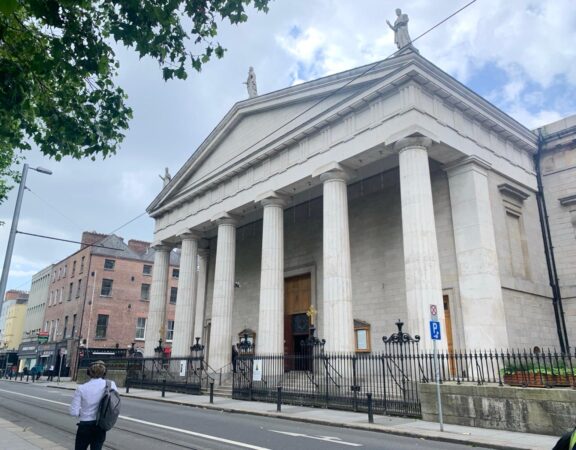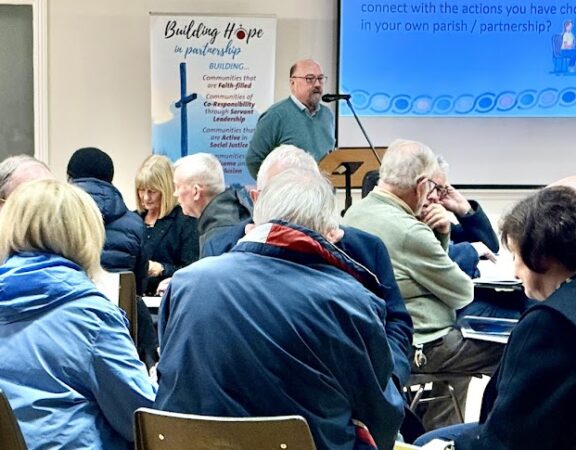In his message for the World Day of Migrants and Refugees in 2005, Pope John Paul II spoke of the need for a dialogue between people of different cultures in a context of pluralism that goes beyond mere acceptance and reaches liking. God, he reminded us, wants to gather every nation and every language around him (cf Is 66:18).
“Christians, must above all listen to the cry for help that comes from a multitude of migrants and refugees, but they must then foster with active commitment, prospects of hope that will herald the dawn of a more open and supportive society,”
Since 2008 began I have had two markedly different experiences of how Irish society is dealing with migrants arriving here. On 6
th January over 1,000 people packed the Pro- Cathedral in Dublin for the third Diocesan Festival of Peoples – it was an event that captured the richness, colour, diversity and wealth of experience with which migrants enrich our parishes and communities.
The presence of so many Dubliners at the event reminded me, as I said on that night, that there is a willingness among us, not just to be anonymous next-door neighbours but people of varied background committed to building community.
It was disappointing, therefore, just days after that event for me to experience worrying signs of intolerance. I had supported the efforts of teachers and Boards of Management and parish in a West Dublin area in trying to build a Catholic school community that reflects the reality of ethnically and religiously mixed communities. I was saddened and shocked to receive a number of e-mails and letters that were striking not just in their negative response to the modest pilot scheme, but marked with a level of fearfulness and selfishness – and indeed barely covered racism – that shocked me and which that we must all work to overcome.
I welcome therefore the initiative taken on by Young Christian Workers in going out and speaking to migrant workers about their experiences here; and in their recommendations. In calling on Churches and Trades Unions to extend their resources to migrants, YCW itself has offered to assist in that process. I am also conscious, as YCW are, that this is not a cynical process designed to bolster numbers at Mass or in membership of Unions or other groups, but a Christian act of help and solidarity.
As Pope Benedict put it in his message for World day of Peace “We do not live alongside one another purely by chance; all of us are progressing along a common path as men and women, and thus as brothers and sisters.” And the Pope draws the important conclusion, “Without (a) transcendent foundation, society is a mere aggregation of neighbours not a community of brothers and sisters called to form one great family.”
The work of the Polish Catholic Chaplaincy is highlighted as being an example of how the Church can in simple, yet effective ways help new communities. With my Vicar for the Pastoral Care of Foreign Nationals, Fr. Gerry Kane, the Archdiocese is working with 13 other chaplains to international communities in Dublin. I hope that this existing structure within the Dublin Diocese will prove effective in trying to achieve some of the recommendations arising from today’s presentation.
Crosscare, the social care agency of the Archdiocese of Dublin has an active Migrant project, which it is timely to recall grew alongside and developed out of the work of Emigrant Advice in Crosscare. That development and their ongoing work and advocacy for both emigrants and immigrants is a reminder to us that the experience of the new Irish is bound with our own very recent experience of emigration. The often difficult experience that Irish people recall, sombrely and often pitifully, should today inform and be reflected in our welcome of those who have left their homes and families to live alongside us and contribute to our economy, our society and indeed our Church life.
What is notable in the work of this report is that its recommendations are not just blanket calls for action to some anonymous state Department or Agency; it is a call to Churches and also today to Trade Unions to act as examples to the communities they represent. It is a call to groups, yet clearly to the individuals within them, not to spend months planning more reports, or inventing new layers and structures, but to use also what is already available—simple yet in their own way powerfully effective means: a meeting place after Mass, and invitation to a parish event, an offer to simply give out information that we know readily exists.
This work of YCW points clearly to the need for more and more accurate research and the gathering of up-to-date statistics which can help us all to realistically plan for the future. Demography is a mathematical science, but it is a mathematical science about the choices which people make. We need to know more about those choices so that we can plan. We need to know more about those choices so that we can understand. We need to get a broader picture about the interaction between economic, work-related, housing-related and other social and cultural factors which drive the decisions of our immigrants, so that we can avoid the mistakes made elsewhere. Ireland has the opportunity to do things differently. We have the chance to get things rights. I thank YCW for this project which combines research and heart.







